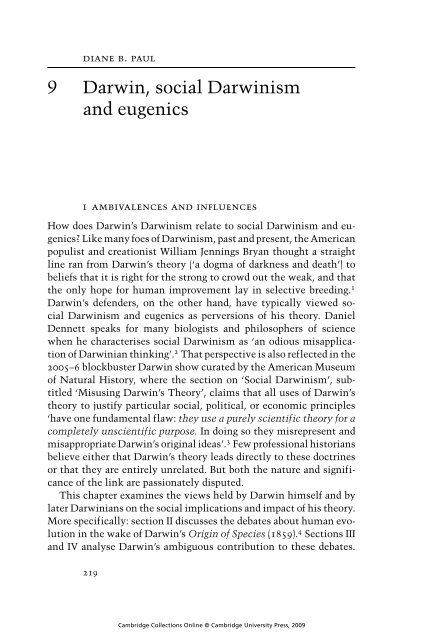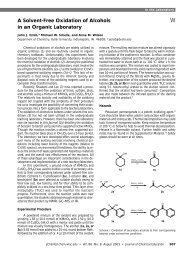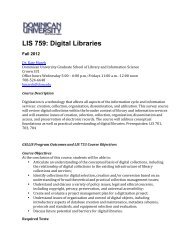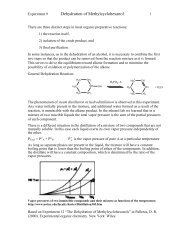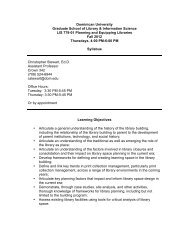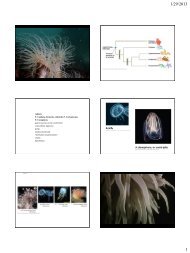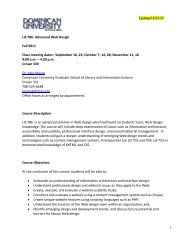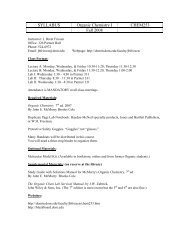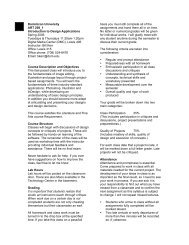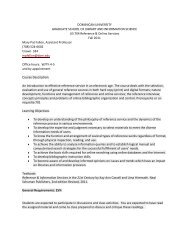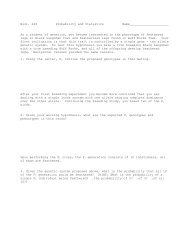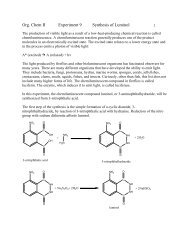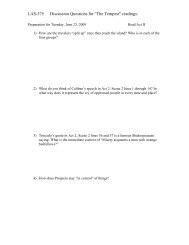9 Darwin, social Darwinism and eugenics
9 Darwin, social Darwinism and eugenics
9 Darwin, social Darwinism and eugenics
Create successful ePaper yourself
Turn your PDF publications into a flip-book with our unique Google optimized e-Paper software.
diane b. paul9 <strong>Darwin</strong>, <strong>social</strong> <strong>Darwin</strong>ism<strong>and</strong> <strong>eugenics</strong>i ambivalences <strong>and</strong> influencesHow does <strong>Darwin</strong>’s <strong>Darwin</strong>ism relate to <strong>social</strong> <strong>Darwin</strong>ism <strong>and</strong> <strong>eugenics</strong>?Like many foes of <strong>Darwin</strong>ism, past <strong>and</strong> present, the Americanpopulist <strong>and</strong> creationist William Jennings Bryan thought a straightline ran from <strong>Darwin</strong>’s theory (‘a dogma of darkness <strong>and</strong> death’) tobeliefs that it is right for the strong to crowd out the weak, <strong>and</strong> thatthe only hope for human improvement lay in selective breeding. 1<strong>Darwin</strong>’s defenders, on the other h<strong>and</strong>, have typically viewed <strong>social</strong><strong>Darwin</strong>ism <strong>and</strong> <strong>eugenics</strong> as perversions of his theory. DanielDennett speaks for many biologists <strong>and</strong> philosophers of sciencewhen he characterises <strong>social</strong> <strong>Darwin</strong>ism as ‘an odious misapplicationof <strong>Darwin</strong>ian thinking’. 2 That perspective is also reflected in the2005–6 blockbuster <strong>Darwin</strong> show curated by the American Museumof Natural History, where the section on ‘Social <strong>Darwin</strong>ism’, subtitled‘Misusing <strong>Darwin</strong>’s Theory’, claims that all uses of <strong>Darwin</strong>’stheory to justify particular <strong>social</strong>, political, or economic principles‘have one fundamental flaw: they use a purely scientific theory for acompletely unscientific purpose. In doing so they misrepresent <strong>and</strong>misappropriate <strong>Darwin</strong>’s original ideas’. 3 Few professional historiansbelieve either that <strong>Darwin</strong>’s theory leads directly to these doctrinesor that they are entirely unrelated. But both the nature <strong>and</strong> significanceof the link are passionately disputed.This chapter examines the views held by <strong>Darwin</strong> himself <strong>and</strong> bylater <strong>Darwin</strong>ians on the <strong>social</strong> implications <strong>and</strong> impact of his theory.More specifically: section II discusses the debates about human evolutionin the wake of <strong>Darwin</strong>’s Origin of Species (1859). 4 Sections III<strong>and</strong> IV analyse <strong>Darwin</strong>’s ambiguous contribution to these debates.219Cambridge Collections Online © Cambridge University Press, 2009
220 diane b. paulSometimes celebrating competitive struggle, he also wished to moderateits effects; sometimes thinking control of human reproductionessential, he also considered compulsory restrictions on breeding impractical<strong>and</strong> immoral. Sections V <strong>and</strong> VI see how others interpretedboth the science <strong>and</strong> <strong>social</strong> meaning of <strong>Darwin</strong>ism. <strong>Darwin</strong>’s followersfound in his ambiguities legitimation for whatever they favoured:laissez-faire capitalism, certainly, but also liberal reform, anarchism<strong>and</strong> <strong>social</strong>ism; colonial conquest, war <strong>and</strong> patriarchy, but also antiimperialism,peace <strong>and</strong> feminism. Section VII relates <strong>Darwin</strong>ism to<strong>eugenics</strong>. <strong>Darwin</strong> <strong>and</strong> many of his followers thought selection nolonger acted in modern society, for the weak in mind <strong>and</strong> body arenot culled. This raised a prospect of degeneration that worried peopleof all political stripes; but there was no consensus on how tocounter this threat. In Nazi Germany, <strong>eugenics</strong> was linked to anespecially harsh <strong>Darwin</strong>ism. Section VIII sees ‘<strong>Darwin</strong>ismus’ embracedinitially by political progressives, <strong>and</strong> only later by racist <strong>and</strong>reactionary nationalists. Section IX concludes by assessing <strong>Darwin</strong>’simpact on <strong>social</strong> issues <strong>and</strong> by reflecting on where we are now.ii in the wake of the originThe Origin did not discuss human evolution; but <strong>Darwin</strong>’s peerswere less reticent, <strong>and</strong> within a month debate focused on the implicationsof <strong>Darwin</strong>’s theory for human biological <strong>and</strong> <strong>social</strong> progress.<strong>Darwin</strong> eventually published his major work on <strong>social</strong> evolution,The Descent of Man, <strong>and</strong> Selection in Relation to Sex, in1871. Inthe Descent, <strong>Darwin</strong> engaged these controversies, especially as theyhad proceeded in Britain.Alfred Russel Wallace, co-discoverer of the principle of naturalselection <strong>and</strong> one of the very few British naturalists from a non-elitefamily, was among the first to discuss its <strong>social</strong> implications. Like<strong>Darwin</strong>, he had been wrestling with the issue for a very long time. 5 Inan influential 1864 paper, Wallace argued that selection would causerationality <strong>and</strong> altruism to spread. Once this process became welldeveloped, individuals with weak constitutions would be cared for;thus selection would come to focus on mental <strong>and</strong> moral, rather thanphysical, qualities. In the struggle for existence among tribes, thosewhose members tended to act in concert <strong>and</strong> show foresight, selfrestraint<strong>and</strong> a sense of right, would have an advantage over tribes inCambridge Collections Online © Cambridge University Press, 2009
<strong>Darwin</strong>, <strong>social</strong> <strong>Darwin</strong>ism <strong>and</strong> <strong>eugenics</strong> 221which these traits were less developed. The former would flourish,resulting in constant mental <strong>and</strong> moral improvement. Ultimately,the whole world would consist of one race, <strong>and</strong> the need for governmentor restrictive laws would vanish.The process that led to utopia would also guarantee the extinctionof native populations such as American <strong>and</strong> BrazilianIndians, Australian aborigines <strong>and</strong> New Zeal<strong>and</strong> Maoris. Accordingto Wallace, ‘savage man’ would inevitably disappear in encounterswith Europeans whose superior intellectual, moral <strong>and</strong> physicalqualities enable them to prevail ‘in the struggle for existence, <strong>and</strong> toincrease at his expense’, just as the more favoured varieties increaseamong animals <strong>and</strong> plants, <strong>and</strong> ‘just as the weeds of Europe overrunNorth America <strong>and</strong> Australia, extinguishing native populations’thanks to their inherently more vigorous ‘organization’ <strong>and</strong> ‘theirgreater capacity for existence <strong>and</strong> multiplication’. 6Wallace’s focus was on the struggle among societies. But many ofhis peers were more concerned with whether selection still operatedat home. Lesser races would not survive the brutal but ultimatelybeneficent (<strong>and</strong> in any case inexorable) struggle with their superiors,but in Britain <strong>and</strong> other ‘civilized societies’ it seemed that theprocess of selection had been checked. Modern medicine <strong>and</strong> humanitarianmeasures prevented elimination of the physically <strong>and</strong>mentally weak. Moreover, the least desirable elements in societywere apparently outbreeding the best, prompting fears that the directionof evolution might actually reverse. The first to sound analarm about the ‘differential birthrate’ was <strong>Darwin</strong>’s cousin, FrancisGalton.In his 1865 essay, ‘Hereditary talent <strong>and</strong> character’, Galton arguedthat human intellectual, moral <strong>and</strong> personality traits – especiallythose making for success in life – were transmitted from parentsto offspring. 7 Consulting biographical dictionaries, Galton demonstratedthat men who had achieved eminence in various fields weremore likely than members of the public at large to have had closemale relatives who were themselves distinguished. Although concedingthat the inheritance of <strong>social</strong> advantage might explain successin some fields, he insisted that most were open to talent. Certainly inscience, literature <strong>and</strong> the law, talented individuals would succeed,no matter how unfavourable their background, while the untalentedwould fail, whatever their <strong>social</strong> connections.Cambridge Collections Online © Cambridge University Press, 2009
222 diane b. paulUnfortunately, it seemed that the intelligent, industrious <strong>and</strong> foresightedwere being outbred by the stupid, lazy <strong>and</strong> reckless. Given thecomplexity of modern life, this trend, if unchecked, could only endin disaster. The decline in intelligence would be especially harmful.How could this tendency be reconciled with <strong>Darwin</strong>’s claim that thestruggle for existence tended to the constant improvement of organicbeings? Galton wrote to his cousin that natural selection ‘seems tome to spoil <strong>and</strong> not to improve our breed’ since ‘it is the classes ofcoarser organisation who seem on the whole the most favoured . . .<strong>and</strong> who survive to become the parents of the next [generation]’. 8The obvious solution was for humans to take charge of their ownevolution, doing for themselves what breeders had done for horses<strong>and</strong> cattle. But as to how exactly the stockbreeders’ methods shouldbe applied, Galton had little to say. He did not propose any specificmeasures to improve human heredity. Galton’s hopes lay in changingmores. If people could only be made to see the importance ofbreeding, a way would surely be found to get the job done.The retired millowner William Greg largely agreed with Galton<strong>and</strong> insisted that, unlike the lower orders, it is the middle classes –energetic, reliable, improving themselves <strong>and</strong> choosing to rise notsink – who delay marriage until they can support a family. But, onhow the resultant swamping of these good elements by bad is to beprevented, Greg was no more specific than Galton. In an ideal world,only those who passed a rigorous competitive examination would beallowed to breed, but admitting this was not a realistic plan, Gregwas left, like Galton, hoping that mores would slowly change in theright direction. 9At about the same time, Walter Bagehot, a banker <strong>and</strong> editorof the Economist, argued that human history, at least in its earlystages, was a bloody <strong>and</strong> brutal affair. The origins of civilisation layin the triumph in intertribal warfare of the more cohesive tribes. Butprogress is not inevitable, for it is difficult to improve a coherent<strong>and</strong> tame society. ‘Oriental’ despotism crushes the required variabilityas soon as it appears. However, Europeans have benefitted fromwarfare-generated innovation <strong>and</strong> racial mixing, their resulting superioritydemonstrated by the outcome of their contact with primitivepeoples. 10In 1868, Wallace shocked <strong>Darwin</strong> <strong>and</strong> many others by denying thatnatural selection alone could account for humans’ higher mental orCambridge Collections Online © Cambridge University Press, 2009
<strong>Darwin</strong>, <strong>social</strong> <strong>Darwin</strong>ism <strong>and</strong> <strong>eugenics</strong> 223moral qualities, <strong>and</strong> crediting their evolution to guidance by forcesfrom a higher world of the spirit. 11 Wishing to distinguish his positionfrom Wallace’s, <strong>Darwin</strong> finally finished The Descent of Man, whichwas published in two volumes in 1871. 12 It did not make nearly asmuch of a splash as had the Origin, perhaps because it was not nearlyas novel. In its applications of the theory of natural selection, hisDescent drew heavily on Malthus, Spencer, Wallace, Galton, Greg,Bagehot <strong>and</strong> other contemporary <strong>social</strong> theorists. 13iii darwin on human biological<strong>and</strong> <strong>social</strong> progress<strong>Darwin</strong>’s reading reinforced views he had developed during the fiveyears (1831–6) he spent circumnavigating the globe on HMS Beagle.<strong>Darwin</strong> hated slavery <strong>and</strong> his comments on the black people hemet, both slave <strong>and</strong> free, were sympathetic <strong>and</strong> respectful. He wasalso repelled by the cruelty of European conquest, <strong>and</strong> often had alow opinion of settler populations. 14 But although shocked by thecolonists’ methods, <strong>Darwin</strong> assumed that conquest itself was inevitable.In the second, 1845, edition of his Journal of Researches,he wrote that, although it is not only the white man who acts as adestroyer, ‘[w]herever the European has trod, death seems to pursuethe aboriginal . . . . The varieties of man seem to act on each otherin the same way as different species of animals – the stronger alwaysextirpating the weaker.’ 15 And while the means might be repellent,he was sure the results would be beneficent. 16<strong>Darwin</strong>’s views on human evolution were strongly influenced byhis encounters with the inhabitants of Tierra del Fuego. On boardthe Beagle were three Fuegians whom its captain, Robert FitzRoy,had captured <strong>and</strong> brought back to Engl<strong>and</strong> on an earlier visit. <strong>Darwin</strong>was impressed both by their acute senses <strong>and</strong> the extent of their culturaltransformation. 17 But on encountering Fuegians in their nativel<strong>and</strong>, he found them unbelievably strange, <strong>and</strong> was shocked by theiraggressive behaviour <strong>and</strong> apparent cruelty. 18Remote as these Fuegians seemed from Englishmen, <strong>Darwin</strong>would always see continuous gradations ‘between the highest menof the highest races <strong>and</strong> the lowest savages’. 19 Rating animals, especiallyunder domestication, highly <strong>and</strong> savages lowly, he could closeany gap in intelligence between the Fuegians <strong>and</strong> the orang-utan asCambridge Collections Online © Cambridge University Press, 2009
224 diane b. paulearly as 1838. 20 He would eventually claim to prefer descent fromthe heroic monkey that risked its own life to save its keeper’s, or theold baboon that rescued a comrade from a pack of dogs, as ‘from a savagewho delights to torture his enemies, offers up bloody sacrifices,practices infanticide without remorse, treats his wives like slaves,knows no decency, <strong>and</strong> is haunted by the grossest superstitions’. 21<strong>Darwin</strong> was thus receptive to Wallace’s argument that selectionguaranteed the extinction of all the primitive peoples with whomEuropeans came into contact. In the Descent, <strong>Darwin</strong> drew onWallace’s 1864 paper <strong>and</strong> also Bagehot’s series of articles to argue thattribes which included the largest proportion of men endowed withsuperior intellectual qualities, sympathy, altruism, courage, fidelity<strong>and</strong> obedience would increase in number <strong>and</strong> eventually displacethe other tribes. ‘Obedience, as Mr. Bagehot has well shewn, is ofthe highest value’, wrote <strong>Darwin</strong>, ‘for any form of government isbetter than none.’ 22 The process of improvement continues to thepresent, as ‘civilised nations are everywhere supplanting barbarousnations’. Since morality is an important element in their success,both the st<strong>and</strong>ard of morality <strong>and</strong> number of moral men will ‘tendeverywhere to rise <strong>and</strong> increase’. Inheritance of property contributesto this process, since without capital accumulation ‘the arts couldnot progress; <strong>and</strong> it is chiefly through their power that the civilisedraces have extended, <strong>and</strong> are now everywhere extending their range,so as to take the place of the lower races’. 23But in his own society, progress is not assured. In the Descent,<strong>Darwin</strong> noted that whereas among savages the weak in mind <strong>and</strong>body are soon eliminated, civilised societies do their best to checkthis selection. Asylums for the ‘imbecile, the maimed, <strong>and</strong> the sick’;poor laws; medical efforts to preserve every life; vaccination againstsmall pox – all entail that the ‘weak members of civilised societiespropagate their kind’. Anyone who has studied ‘the breeding of domesticanimals’ cannot doubt ‘that this must be highly injurious tothe race of man’. Want of care, or care wrongly directed, leads tothe ‘degeneration of a domestic race’. But except ‘in the case of manhimself, hardly any one is so ignorant as to allow his worst animalsto breed’. 24 <strong>Darwin</strong> immediately remarks, however, that the sympatheticinstincts that lead us to aid the helpless are themselves theproduct of natural selection. Moreover, we could not suppress theseinstincts without damaging the ‘noblest part of our nature’. To ignoreCambridge Collections Online © Cambridge University Press, 2009
<strong>Darwin</strong>, <strong>social</strong> <strong>Darwin</strong>ism <strong>and</strong> <strong>eugenics</strong> 225the weak <strong>and</strong> helpless purposely would be to commit a certain <strong>and</strong>great evil in return for what is only a possible future benefit. ‘Hencewe must bear without complaining the undoubtedly bad effects of theweak surviving <strong>and</strong> propagating their kind.’ 25 Moreover, while selectionhas been checked in many ways, it continues to operate in others.Thus it works to develop the body, as can be seen in the fact thatcivilised men are stronger than savages <strong>and</strong> have equal powers of endurance.It favours the intellectually able, even amongst the poorestclasses. And it tends to eliminate the worst dispositions. Criminalsare executed or sent to jail, <strong>and</strong> so are unable to pass on their badqualities. The insane kill themselves or are institutionalised. Violentmen die violently, <strong>and</strong> prematurely. The restless emigrate. The intemperatedie young <strong>and</strong> the sexually profligate are often diseased.On the other h<strong>and</strong>, the very poor <strong>and</strong> the reckless almost alwaysmarry early, while those who are virtuous enough to wait until theycan support a family in comfort do so late in life. The former producemany more children who also, being born during their mothers’prime of life, tend to be more physically vigorous. Quoting Greg,<strong>Darwin</strong> regrets that the vicious members of society tend to reproducemore rapidly than the virtuous. There are, however, counters tothis process too: mortality among the urban poor <strong>and</strong> among womenwho marry at a very early age is (it seems fortunately) high. Butif these <strong>and</strong> other checks ‘do not prevent the reckless, the vicious,<strong>and</strong> the otherwise inferior members of society from increasing at aquicker rate than the better class of men’, <strong>Darwin</strong> warns, thinking ofBagehot <strong>and</strong> Henry Maine, ‘the nation will retrograde, as has occurredtoo often in the history of the world. We must rememberthat progress is no invariable rule.’ 26 This prospect remained a lifelongconcern. Wallace noted that in one of their last conversations,<strong>Darwin</strong> had expressed gloomy views about the future because ‘inour modern civilization natural selection had no play, <strong>and</strong> the fittestdid not survive’. Those winning wealth are not ‘the best or the mostintelligent’ <strong>and</strong> ‘our population is more largely renewed in each generationfrom the lower than from the middle <strong>and</strong> upper classes’. 27iv the way forwardBut what to do? Here <strong>Darwin</strong>, like Galton <strong>and</strong> Greg, had little tosay. Advancing the welfare of mankind is a most ‘intricate’ problem.Cambridge Collections Online © Cambridge University Press, 2009
226 diane b. paulPopulation pressure has been an essential element in mankind’s advance.‘Natural selection follows from the struggle for existence; <strong>and</strong>this from a rapid rate of increase. It is impossible not bitterly to regret,but whether wisely is another question, the rate at which man tendsto increase; for this leads in barbarous tribes to infanticide <strong>and</strong> manyother evils, <strong>and</strong> in civilised nations to abject poverty, celibacy, <strong>and</strong>to the late marriages of the prudent.’ 28 But if man had not been subjectto such pressure, he would not have attained his present rank.At the close of the Descent, <strong>Darwin</strong> considers the contemporaryimplications of this principle. On the one h<strong>and</strong>, he reasons, thosewho are unable to avoid abject poverty for their children should notreproduce. But on the other, if only those who are prudent refrainfrom marriage, the inferior members of society will supplant the superior.Malthusian ‘moral restraint’ is thus a counter-selective factor.He concludes with a reminder that: ‘Man, like every other animal,has no doubt advanced to his present high condition through a strugglefor existence consequent on his rapid multiplication’ <strong>and</strong> warnsthat the advance will be halted unless he remains subject to severestruggle.Otherwise, he would soon sink into indolence, <strong>and</strong> the more highly-giftedmen would not be more successful in the battle of life than the less gifted.Hence our natural rate of increase, though leading to many <strong>and</strong> obviousevils, must not be greatly diminished by any means. There should be opencompetition for all men; <strong>and</strong> the most able should not be prevented by laws orcustoms from succeeding best <strong>and</strong> rearing the largest number of offspring. 29However, immediately after voicing that classically ‘<strong>social</strong><strong>Darwin</strong>ist’ sentiment, he notes that moral qualities are advancedmuch more by habit, reason, learning <strong>and</strong> religion than by naturalselection.<strong>Darwin</strong>’s views on inheritance of property <strong>and</strong> suspicion of labourunions clearly mark him as a Whig. He condemned primogeniture,on the grounds that it enabled the eldest sons, no matter how weakin mind or body, to marry, while often preventing superior youngersons from doing likewise. But here, too, there were compensatorychecks. 30 <strong>Darwin</strong> did unambiguously favour allowing inheritance ofmoderate amounts of wealth. Holding capital accumulation to bepartly responsible for the success of European colonisation, he alsothought it necessary for continued domestic progress.Cambridge Collections Online © Cambridge University Press, 2009
<strong>Darwin</strong>, <strong>social</strong> <strong>Darwin</strong>ism <strong>and</strong> <strong>eugenics</strong> 227<strong>Darwin</strong> himself had been generously supported by his father, whoprovided not just an allowance but Down House as a gift <strong>and</strong> a largeinheritance at his death in 1848. Combined with income from royalties,rents, <strong>and</strong> especially investments, a marriage gift, <strong>and</strong> an inheritancefrom his older brother, his estate at his death was worthover a quarter of a million pounds, apart from a trust established forhis wife Emma. 31 His family’s wealth had enabled <strong>Darwin</strong> to pursuehis career, an experience reflected in his comment that, while inheritanceof property means that children will not start at the same placein the ‘race for success’, capital accumulation is nevertheless necessaryfor progress both in the arts <strong>and</strong> intellectual work. Indeed, ‘thepresence of a body of well-instructed men, who have not to labourfor their daily bread, is important to a degree which cannot be overestimated’.32 Perhaps unsurprisingly, Wallace, whose family couldnot afford to keep him in school past the age of thirteen, came to theopposite opinion. He thought that inheritance in property should beabolished.Shortly after the Descent appeared, Heinrich Fick, a law professorat the University of Zurich, sent <strong>Darwin</strong> a copy of an essay he hadwritten urging restrictions on marriage for men ineligible for militaryservice (to counter the dysgenic effects of war) <strong>and</strong> opposingegalitarian <strong>social</strong> policies (since they advantage the weak). In reply,<strong>Darwin</strong> voiced a hope that Fick would at some point discuss whathe considered a serious problem in Britain: the insistence by tradeunions that all workmen, ‘the good <strong>and</strong> bad, the strong <strong>and</strong> weak’,should all work the same hours for the same wages. ‘The unions arealso opposed to piece-work, – in short to all competition.’ He fears,too, that Cooperative Societies ‘likewise exclude competition’. Thisseemed ‘a great evil for the future progress of mankind’. But he neverpublished such sentiments, perhaps partly out of caution, but also becausewith <strong>Darwin</strong> there was always an ‘on the other h<strong>and</strong>’. In thiscase, <strong>Darwin</strong> continues: ‘ – Nevertheless, under any system, temperate<strong>and</strong> frugal workmen will have an advantage <strong>and</strong> leave moreoffspring than the drunken <strong>and</strong> reckless.’ 33Nor did <strong>Darwin</strong> propose any practical measures to control humanbreeding. Even in his own life, <strong>Darwin</strong>’s worries did not translateinto action. The <strong>Darwin</strong>–Wedgwood family was highly inbred, <strong>and</strong>,perhaps as a result, experienced more than its share of mental <strong>and</strong>physical infirmities. Charles, despite anxieties about the ill-effects ofCambridge Collections Online © Cambridge University Press, 2009
228 diane b. paulinbreeding, did marry his first cousin, Emma Wedgwood. Moreover,his nearly lifelong battle with ill-health began three years before hismarriage, <strong>and</strong> he worried constantly about inflicting hereditary illnesson his children. But this did not inhibit him from siring nineof them. 34 In the public as well as private sphere, <strong>Darwin</strong>’s anxietiesfound little tangible expression. Like Galton, he urged his readersto pay at least as much attention to the pedigrees of their prospectivemates as to those of their horses <strong>and</strong> dogs. For he was emphaticabout the operation of sexual selection in humans. Males selectedfemales for physical beauty <strong>and</strong> emotional qualities, while femalesselected males for their strength, intellect <strong>and</strong> status. This explainswhy women surpass men in tenderness, intuition <strong>and</strong> selflessness,but have less energy, courage <strong>and</strong> intelligence. <strong>Darwin</strong> concludedthat, although they should be educated, women cannot compete successfullywith men, <strong>and</strong> are, by nature, best suited to domestic life.But all the concrete suggestions for encouraging reproduction ofthe valuable members of society or discouraging it by the undesirablemembers seemed to <strong>Darwin</strong> either impractical or morally suspect.He thought it unlikely that the reckless could be convinced to refrainfrom breeding, <strong>and</strong> he was too much of a Whig even to contemplateusing the power of the state to segregate them from the rest of society.Nor did he think that the gifted would respond to appeals to havemore children. Like Galton, he was left to hope that education wouldproduce a change in values. Unlike Galton, he does not seem tohave been very optimistic about the chances of such changes takingplace.v <strong>social</strong> darwinism <strong>and</strong> <strong>social</strong>ist darwinism<strong>Darwin</strong>’s waverings certainly contributed to the diverse readings of<strong>Darwin</strong>ism, as did ambiguities in the Origin about the locus <strong>and</strong>meaning of struggle. <strong>Darwin</strong> had stressed the importance of strugglewithin species, believing it to be the most severe since these individualslived in the same places, ate the same food <strong>and</strong> faced the samedangers. Advocates of laissez-faire tended to follow suit. But <strong>Darwin</strong>also noted that he used the term ‘Struggle for Existence in a large <strong>and</strong>metaphorical sense, including dependence of one being on another’. 35Some of his followers read him as deprecating intra-specific struggle,at least among the <strong>social</strong> species, <strong>and</strong> as emphasising the value ofCambridge Collections Online © Cambridge University Press, 2009
<strong>Darwin</strong>, <strong>social</strong> <strong>Darwin</strong>ism <strong>and</strong> <strong>eugenics</strong> 229within-group cooperation instead – a reading bolstered by <strong>Darwin</strong>’saccount of human evolution. Mutualistic readings tended to appealto <strong>social</strong>ists, anarchists <strong>and</strong> liberal reformers, as well as (or including)those who appropriated <strong>Darwin</strong> to argue for racial, national or classsuperiority. Of course there was no need to choose, <strong>and</strong> many writersinvoked natural selection to argue for laissez-faire at home <strong>and</strong>imperial conquest abroad. 36Certainly, apologists for dog-eat-dog capitalism easily foundelements to their liking. As early as 4 May 1860, <strong>Darwin</strong> famouslyremarked in a letter to Charles Lyell: ‘I have received in a ManchesterNewspaper rather a good squib, showing that I have proved “mightis right,” & therefore that Napoleon is right, & every cheatingTradesman is often right.’ It is notable that the reference wasto a commentary on the Origin that appeared in the ManchesterGuardian under the title ‘National <strong>and</strong> Individual Rapacity Vindicatedby the Laws of Nature.’ 37 The commentary obviously involveda crude extrapolation. Nevertheless, the Origin was easily appropriatedfor such purposes, as the writings of Greg <strong>and</strong> other early commentatorsattest.That reading of <strong>Darwin</strong>ism – as a biologistic justification forlaissez-faire <strong>and</strong> colonialism – is what is generally implied by theterm ‘<strong>social</strong> <strong>Darwin</strong>ism’. It was a term that would have baffled<strong>Darwin</strong>. In Victorian Engl<strong>and</strong>, scientists took for granted that biologicalfacts mattered for <strong>social</strong> theory <strong>and</strong> policy. As James Moorehas noted: ‘ “<strong>Darwin</strong>ismus” in Germany <strong>and</strong> “<strong>Darwin</strong>ism” in theEnglish-speaking world quite sufficed to express <strong>Darwin</strong>’s intentions,all his allies’ hopes, <strong>and</strong> all his critics’ fears.’ 38Coined around the turn of the century, the phrase ‘<strong>social</strong> <strong>Darwin</strong>ism’was popularised in the mid-1940s by the American historianRichard Hofstadter. It has ever since been a term of abuse, applied topeople, policies <strong>and</strong> ideas of which the writer disapproved. (People donot identify themselves as ‘<strong>social</strong> <strong>Darwin</strong>ists’.) A New Deal liberal,Hofstadter’s target was laissez-faire conservatism. In his historicalaccount, <strong>social</strong> <strong>Darwin</strong>ism was an essentially conservative ideology<strong>and</strong> <strong>social</strong> movement, which appropriated the theory of evolutionby natural selection to support unrestricted laissez-faire at home<strong>and</strong> colonialism abroad. It ostensibly flourished in the late nineteenthcentury, reaching its zenith in Gilded-Age America, whereit appealed not just to professional <strong>social</strong> thinkers, but to a wideCambridge Collections Online © Cambridge University Press, 2009
230 diane b. paulswath of the middle class. Its proponents held that it was only naturalthat ‘the best competitors in a competitive situation would win’,that this process would lead to continuing (if slow) improvement,<strong>and</strong> that efforts to hasten improvement through <strong>social</strong> reform weredoomed to failure. 39But as Hofstadter himself acknowledged, the Origin was also appropriatedfor quite different ends. Socialists found in <strong>Darwin</strong>ismsupport for religious scepticism <strong>and</strong> belief in the inevitability ofchange. Some (but not Marx) also found in his theory a direct basisfor <strong>social</strong>ist principles. One <strong>social</strong>ist strategy was to elide the strugglefor existence with the struggle among classes, arguing that theproletariat would inevitably triumph. Another was to claim that thestruggle now was among societies, nations or races, a battle thatwould be undermined by class conflict. A third was to de-emphasiseindividual struggle, finding in <strong>Darwin</strong>ism a basis for altruistic <strong>and</strong>cooperative behaviour. (Occasionally, these themes would combine,as in August Bebel’s Die Frau <strong>and</strong> der Sozialismus, which arguesthat a fierce struggle for existence will prevail until the victory ofthe proletariat, after which <strong>social</strong> solidarity will reign.)Anarchists such as Prince Peter Kropotkin <strong>and</strong> liberal reformersin the US <strong>and</strong> Britain also de-emphasised individual struggle, findingin the Origin support for a holistic view of nature as a ‘tangled bank’characterised by a complex web of relations. Often drawing as muchon Herbert Spencer as <strong>Darwin</strong>, they argued that the struggle for existencewas not primarily about combat, at least among members oftheir own group, but coexistence. 40 Some cited <strong>Darwin</strong>’s argumentin the Descent that the development of reason, feelings of sympathy,<strong>and</strong> cooperation were key to human evolution. Moreover, byemphasising the Lamarckian elements in <strong>Darwin</strong>, they were able toclaim that humans could escape the grip of biology <strong>and</strong> create <strong>social</strong>organisations which fostered desirable traits.The softer, anti-deterministic view of <strong>Darwin</strong>ism was also sharedby the ‘peace biologists’. <strong>Darwin</strong>ism was, of course, used to justifywarfare <strong>and</strong> imperial conquest. In the dominant motif, naturewas brutal <strong>and</strong> humans were beasts. Humans were part of a naturalworld, which is characterised by a relentless struggle for existence,in which the strongest, fleetest, most cunning prevail. Human behaviourreflects man’s animal origins. Belligerence <strong>and</strong> territorialityare ineradicable instincts, deeply rooted in human nature. HumansCambridge Collections Online © Cambridge University Press, 2009
<strong>Darwin</strong>, <strong>social</strong> <strong>Darwin</strong>ism <strong>and</strong> <strong>eugenics</strong> 231are ‘fighting apes’, as nineteenth-century popularisers had it, <strong>and</strong> waran essential part of the evolutionary process. British anthropologistSir Arthur Keith famously asserted: ‘Nature keeps her human orchardhealthy by pruning; war is her pruning-hook.’ 41 Moreover, iflife is warfare, then discipline <strong>and</strong> obedience are cardinal virtues. 42But pacifists also found resources in <strong>Darwin</strong>. They argued that murder<strong>and</strong> war were rare among animals within their own species. Onlyman regularly killed his own kind. They challenged the assumptionthat beasts were bestial, citing <strong>Darwin</strong>’s examples of cooperationamong animals, as well as evidence of their intelligence, loyalty,bravery, affection <strong>and</strong> self-sacrificing behaviour. And they could cite<strong>Darwin</strong>’s comments in the second edition of the Descent, where hecriticised conscription <strong>and</strong> war on the grounds that the former preventedhealthy males from marrying during their prime, while thelatter exposed them to the risk of early death. Following this line ofargument, some anti-militarists claimed that even if war had oncebeen a progressive force, it was now dysgenic. 43 In Britain, the slaughterof fit young men in the First World War led many <strong>Darwin</strong>ians torethink the evolutionary value of warfare <strong>and</strong> ultimately to rejectthe idea that it was beneficial. 44<strong>Darwin</strong>ism was similarly used to legitimate every view ofwomen’s abilities <strong>and</strong> appropriate roles. <strong>Darwin</strong>’s authority was invokedin support of the claim that women’s place was in the home,not the school or the workplace. 45 But the theory of sexual selection,which for <strong>Darwin</strong> accounted for gender differences, was also turnedto radical uses. Socialists <strong>and</strong> feminists could argue that, in contemporarysociety, sexual selection had been thwarted. Men who werestupid <strong>and</strong> vicious had no trouble finding mates, as long as theywere rich. Women were forced by <strong>social</strong> circumstances to chooseas husb<strong>and</strong>s men who could support them, however inferior theirpersonal qualities. A character in Looking Backward, an influentialnovel by the American utopian <strong>social</strong>ist Edward Bellamy, explainedthat, in the new Boston of the year 2000, sexual selection has fullplay. Thus poverty no longer induces ‘women to accept as the fathersof their children men whom they neither can love nor respect.Wealth <strong>and</strong> rank no longer divert attention from personal qualities.Gold no longer “gilds the straitened forehead of the fool”. The giftsof person, mind, <strong>and</strong> disposition ...aresure of transmission toposterity.’ 46 Many <strong>social</strong> radicals – including Wallace in Britain <strong>and</strong>Cambridge Collections Online © Cambridge University Press, 2009
232 diane b. paulVictoria Woodhull <strong>and</strong> Charlotte Perkins Gilman in the US – arguedthat the continued subjugation of women thwarts sexual selection<strong>and</strong> thus endangers the future of the race. 47vi darwinism, lamarckism <strong>and</strong> societyThe meaning of ‘<strong>social</strong> <strong>Darwin</strong>ism’ is muddied not just by the use of<strong>Darwin</strong>ism to justify a variety of existing or proposed <strong>social</strong> arrangements,but by the fact that many advocates of laissez-faire rejectedthe principle of natural selection or minimised its significance. Indeed,some stereotypical ‘<strong>social</strong> <strong>Darwin</strong>ists’ preferred the theory, associatedwith Lamarck, that organisms acquire new characteristicsas the result of a process of active adaptation to their environments.These ‘neo-Lamarckians’ included the British philosopher HerbertSpencer, who argued that unfettered economic competition wouldcull the unfit <strong>and</strong> also act as a spur to improvement. For Spencer,competition functioned to make creatures work harder, <strong>and</strong> thusto exercise their organs <strong>and</strong> faculties (in contrast with <strong>Darwin</strong>, forwhom competition worked mainly to spread minority traits throughouta population). The mental powers, skills <strong>and</strong> traits of characterfostered by this struggle would be transmitted to future generations,resulting in constant material <strong>and</strong> moral progress. Ultimately (<strong>and</strong>inevitably) the evolutionary process would produce a perfect societycharacterised by stability, harmony, peace, altruism <strong>and</strong> cooperation.L<strong>and</strong> would be held in common, women would have the same rightsas men <strong>and</strong> government would become superfluous, <strong>and</strong> ultimatelydisappear. 48 In the meantime, the state should do nothing to alleviatethe sufferings of the unfit. After all, as Spencer wrote in 1850,‘the whole effort of nature is to get rid of such, to clear the world ofthem, to make room for better’. 49Peter Bowler argues that Spencer’s emphasis on the value ofself-help was much closer to the spirit of competitive capitalismthan <strong>Darwin</strong>’s more fatalistic principle of natural selection ofchance variations. 50 In any case, many <strong>social</strong> theorists, especiallyin America, owed more – sometimes much more – to Spencer thanto <strong>Darwin</strong>. 51 Indeed, in 1907, the American sociologist Lester FrankWard declared that he had ‘never seen any distinctively <strong>Darwin</strong>ianprinciple appealed to in the discussion of “<strong>social</strong> <strong>Darwin</strong>ism” ’. 52(More recently, Antonello La Vergata jokingly suggested thatCambridge Collections Online © Cambridge University Press, 2009
<strong>Darwin</strong>, <strong>social</strong> <strong>Darwin</strong>ism <strong>and</strong> <strong>eugenics</strong> 233‘<strong>Darwin</strong> was one of the very few Social <strong>Darwin</strong>ists who was really a<strong>Darwin</strong>ian’. 53 )Given that Spencer both minimised the role of natural selection<strong>and</strong> developed much of his theory before 1859, is it reasonable to classifyhim <strong>and</strong> his followers as ‘<strong>social</strong> <strong>Darwin</strong>ists’? Or if the term hasvalue at all, should it be reserved for those who explicitly invoked<strong>Darwin</strong>’s own theory? That issue is complicated by the fact thatwhat counts as ‘<strong>Darwin</strong>’s theory’ in the late nineteenth century isfar from obvious, both because <strong>Darwin</strong>’s own views shifted over time,<strong>and</strong> because ‘<strong>Darwin</strong>ism’ was often employed interchangeably with‘evolutionism’. In particular, the boundary between Lamarckism <strong>and</strong><strong>Darwin</strong>ism was blurred. Many scientists who downplayed the role ofnatural selection were nonetheless considered <strong>Darwin</strong>ians; indeed,<strong>Darwin</strong> himself accorded significant (<strong>and</strong> over time, increasing)scope to Lamarckian factors. The confused relationship between‘<strong>Darwin</strong>ism’ <strong>and</strong> ‘Lamarckism’ is nicely illustrated by Bagehot’sPhysics <strong>and</strong> Politics, which was subtitled ‘Or Thoughts on the Applicationof the Principles of “Natural Selection” <strong>and</strong> “Inheritance”to Political Society’. According to Bagehot, the traits favoured inwarfare are produced by a Lamarckian process in which changingdesires produce changes in habits, which are transmitted to the nextgeneration: ‘it is the silent toil of the first generation that becomesthe transmitted aptitude of the next’. Indeed, history is ‘a science toteach the law of tendencies – created by the mind, <strong>and</strong> transmittedby the body – which act upon <strong>and</strong> incline the will of man from ageto age’. 54Thus efforts to stipulate a definition of ‘<strong>social</strong> <strong>Darwin</strong>ism’ are frustratedboth by <strong>Darwin</strong>ism’s association with contradictory causes<strong>and</strong> the lack of specifically <strong>Darwin</strong>ian content in the views ofmany classical ‘<strong>social</strong> <strong>Darwin</strong>ists’. Historians have weighted thesefactors differently, resulting in a plethora of definitions, rangingfrom the very narrow – the conventional identification of ‘<strong>social</strong><strong>Darwin</strong>ism’ with the legitimation of laissez-faire capitalism – to thevery expansive – its application to any <strong>social</strong> use of <strong>Darwin</strong>’s theory(or even to any <strong>social</strong> use of evolutionary theory, irrespectiveof its debt to <strong>Darwin</strong>). Steering a middle course are historians whorecognise the multivalent character of the theory, but believethey can identify some core doctrine uniting the variousstr<strong>and</strong>s. 55 Cambridge Collections Online © Cambridge University Press, 2009
234 diane b. paulThe absence of agreement on the meaning of <strong>social</strong> <strong>Darwin</strong>ism (oreven whether it has one) assures that there will be different views ofits relation to <strong>eugenics</strong>. If <strong>social</strong> <strong>Darwin</strong>ism is equated with laissezfaire,a programme to intervene with individual reproductive decisionsmay seem its obverse. If the term applies to collectivist aswell as individualist ideologies, <strong>eugenics</strong> is more plausibly viewedas one form of <strong>social</strong> <strong>Darwin</strong>ism. 56 But at least there is virtual consensusamong historians that <strong>eugenics</strong> was linked in some importantway to <strong>Darwin</strong>’s theory. Even Robert Bannister, who dismisses <strong>social</strong><strong>Darwin</strong>ism as a myth, accepts that, ‘the idea of pruning humanitylike so many roses was indeed a logical deduction from the Originof Species, if one could stifle the moral sensibilities that troubled<strong>Darwin</strong> himself’. 57vii nature, nurture <strong>and</strong> <strong>eugenics</strong><strong>Darwin</strong> <strong>and</strong> his nineteenth-century compatriots worried that, iftraits making for <strong>social</strong> success <strong>and</strong> failure were heritable, <strong>and</strong> ifthe failures were producing more children than the successful, theresult would be degeneration. But in <strong>Darwin</strong>’s day, the view thatheredity held the key to <strong>social</strong> success was not widely accepted.Indeed, <strong>Darwin</strong> himself, while claiming to have been converted toGalton’s perspective on the importance of inherited intellect, continuedto believe that zeal <strong>and</strong> hard work also mattered. Moreover, whileLamarckism reigned, hereditarian beliefs did not necessarily implysupport for programmes of selective breeding. Even those who assumedthat <strong>social</strong> problems were due to bad heredity often concludedthat the solution lay in <strong>social</strong> reform. As long as the Lamarckian viewheld sway, it made no sense to counterpose nature <strong>and</strong> nurture.By the turn of the century, however, Lamarckism – while farfrom dead, even in scientific circles – was in decline. A corollaryof the increasingly popular view that heredity was hard (that is, non-Lamarckian) was the belief that the only solution to <strong>social</strong> problemswas to discourage reproduction by those with undesirable traits,while encouraging reproduction by society’s worthier elements. In1883, Galton coined the word ‘<strong>eugenics</strong>’ to describe this programme.It would soon acquire a wide <strong>and</strong> enthusiastic following, whichcut across the usual political divisions. Middle-class people of everypolitical persuasion – conservative, liberal <strong>and</strong> <strong>social</strong>ist – werealarmed by the apparently profligate breeding of what in BritainCambridge Collections Online © Cambridge University Press, 2009
<strong>Darwin</strong>, <strong>social</strong> <strong>Darwin</strong>ism <strong>and</strong> <strong>eugenics</strong> 235was called the ‘<strong>social</strong> residuum’. Galton, Greg <strong>and</strong> <strong>Darwin</strong> lackedany real evidence to support their intuitions that the least able elementsin society were outbreeding the capable. However, a raftof reports <strong>and</strong> demographic studies seemed to confirm their worstfears. In Britain, the large number of recruits rejected for militaryservice in the Boer War, <strong>and</strong> statistical studies demonstrating acorrelation between large families <strong>and</strong> poor <strong>social</strong> conditions weretaken as proof that the nation was deteriorating. This disturbingtrend was exacerbated by the First World War, which resulted in thedeaths of the fittest young men, <strong>and</strong> was widely viewed as a eugenicdisaster.How to counter this trend? Galton had been principally concernedto encourage the talented to have large families; that is, with what hetermed ‘positive’ <strong>eugenics</strong>. But in the twentieth century, ‘negative’measures came to seem much more urgent. In the United States,Canada <strong>and</strong> much of Northern Europe, as well as Britain, the centralquestion was how best to discourage breeding by moral <strong>and</strong> mentaldefectives.In the 1870s, when <strong>Darwin</strong> wrote the Descent, education <strong>and</strong>moral suasion appeared even to most alarmists as the only acceptablemeans of preventing the swamping of the better by the worse.But by the turn of the century, new views of heredity had convergedwith a heightened sense of danger <strong>and</strong> changing attitudes towardsthe state to make active intervention more acceptable. <strong>Darwin</strong><strong>and</strong> Greg were too imbued with Whig distrust of government topropose that it restrict human breeding, <strong>and</strong> even Galton realisedthat public opinion would not accept this. As a commitment tolaissez-faire gave way to acceptance of collectivist-oriented reform,efforts to intervene actively with reproduction in the interests ofthe community acquired greater legitimacy. To those who had faithin disinterested expertise <strong>and</strong> the virtues of state planning, controlof breeding seemed only common sense. 58Initially, intervention took the form of segregation of ‘defectives’during their reproductive years. Since institutionalisation wasexpensive, sterilisation (vasectomy in men, tubal ligation inwomen) became an increasingly popular alternative, especially withthe advent of the world-wide economic depression of the 1930s.Sterilisation was opposed, along with contraception <strong>and</strong> abortion, bythe Catholic Church <strong>and</strong>, in Britain, by the Labour Party (which sawits members as potential targets). But by 1940 sterilisation laws hadCambridge Collections Online © Cambridge University Press, 2009
236 diane b. paulbeen passed by thirty American states, three Canadian provinces, aSwiss canton, Germany, Estonia, all of the Sc<strong>and</strong>inavian <strong>and</strong> most ofthe Eastern European countries, Cuba, Turkey <strong>and</strong> Japan. (However,sterilisation may have flourished in some locales without benefitof law, <strong>and</strong> imposing statutory control was sometimes intendedto limit its informal practice.) 59 In the United States, advocatesof immigration restriction argued that newcomers from Southern<strong>and</strong> Eastern Europe were both biologically inferior to ‘old stock’Americans <strong>and</strong> rapidly multiplying. In 1924, the ImmigrationRestriction Act sharply reduced the total number of allowableentrants, <strong>and</strong>, through adoption of a quota system, reduced to atrickle new entrants from Russia, Pol<strong>and</strong>, the Balkans <strong>and</strong> Italy. 60The most extensive <strong>and</strong> brutal eugenic measures were adoptedin Germany. The 1933 Law for the Prevention of GeneticallyDiseased Offspring, passed soon after Hitler’s ascent to power, encompasseda wide range of ostensibly heritable conditions, <strong>and</strong> appliedalso to the non-institutionalised; it ultimately affected about400,000 people (compared with about 60,000 in the United States).But German Rassenhygiene involved much more than a massiveprogramme of sterilisation. The Nuremberg Laws barred Jewish–German marriages. The Lebensborn programme encouraged racially‘pure’ German women, both single <strong>and</strong> married, to bear the childrenof SS officers. The Aktion T-4 programme <strong>and</strong> its various sequels‘euthanised’ (the euphemism for murder by gassing, starvation <strong>and</strong>lethal injection) up to 200,000 of the country’s institutionalised mentally<strong>and</strong> physically disabled, sometimes with the tacit consent oftheir families. 61 The penal system was reformed so that many minoroffenders were punished with death in order to counter the dysgeniceffects of war. 62 These policies of ruthless selection were a preludeto extermination of Jews <strong>and</strong> other racial <strong>and</strong> political undesirables.Efforts to maintain racial purity <strong>and</strong> rid the country of ‘useless eaters’often employed <strong>Darwin</strong>ian rhetoric: survival of the fittest, selection<strong>and</strong> counterselection. That language had wide resonance, for<strong>Darwin</strong>ism was particularly popular in Germany.viii from darwin to hitler?Nowhere did the Origin have a greater initial impact than Germany,where the book appeared in translation within a year of itsCambridge Collections Online © Cambridge University Press, 2009
<strong>Darwin</strong>, <strong>social</strong> <strong>Darwin</strong>ism <strong>and</strong> <strong>eugenics</strong> 237publication in English. Many scientists endorsed <strong>Darwin</strong>’s theory,which was also widely popularised, most effectively by the Universityof Jena zoologist, Ernst Haeckel. Both liberals <strong>and</strong> Marxistswere enthusiastic. Indeed, Karl Marx’s friend Wilhelm Liebknecht reportedthat, following publication of the Origin, he <strong>and</strong> his comrades‘spoke for months of nothing else but <strong>Darwin</strong> <strong>and</strong> the revolutionizingpower of his scientific conquests’. 63 The response in Germany wasso enthusiastic that in 1868 <strong>Darwin</strong> wrote that, ‘the support which Ireceive from Germany is my chief ground for hoping that our viewswill ultimately prevail’. 64In the 1860s <strong>and</strong> 1870s, the political uses of <strong>Darwin</strong>ism inGermany had been predominantly subversive. 65 Given the failure ofthe Revolution of 1848, the aristocracy <strong>and</strong> the Catholic Church remainedpowerful forces, especially in Prussia, the most important ofthe German states. Socialists of all stripes saw that <strong>Darwin</strong>’s theorycould be appropriated both to argue for the inevitability of progressivechange <strong>and</strong> against religion. Marxian <strong>social</strong>ists (including Marxhimself) were often uncomfortable with the Malthusian element in<strong>Darwin</strong>ism. As with many of <strong>Darwin</strong>’s interpreters elsewhere, theytended to downplay natural selection in favour of Lamarckian <strong>and</strong>other evolutionary mechanisms, <strong>and</strong> also to deny that biological lawscould be directly applied to society. Other Marxists <strong>and</strong> many non-Marxists read <strong>social</strong>ism directly from <strong>Darwin</strong>ism. But irrespectiveof their specific interpretations of <strong>Darwin</strong>, nearly all <strong>social</strong>ists sawhim as an ally. Works on his theory flowed from the German <strong>social</strong>istpress; it was the most popular non-fiction topic among workers. 66 Indeed,workers were generally more inclined towards scientific thaneconomic <strong>and</strong> political titles, <strong>and</strong> vastly more interested in <strong>Darwin</strong>than the difficult-to-underst<strong>and</strong> Marx. 67 The embrace of <strong>Darwin</strong>ismby the Left led a puzzled <strong>Darwin</strong> to comment in 1879: ‘What a foolishidea seems to prevail in Germany on the connection betweenSocialism <strong>and</strong> Evolution through Natural Selection.’ 68Liberals also viewed <strong>Darwin</strong>ism as an ally in their war with theCatholic Church, the monarchy <strong>and</strong> the Junkers (conservative noblel<strong>and</strong>-owners). Haeckel’s popular writings of this period express primarilyliberal ideals <strong>and</strong> aspirations: laissez faire, anti-clericalism,intellectual freedom, anti-militarism, an end to inherited privilege.The nobility has no right to feel privileged, he argues, giventhat all human embryos – of nobles as well as commoners – areCambridge Collections Online © Cambridge University Press, 2009
238 diane b. paulindistinguishable in their early stages from those of dogs <strong>and</strong> othermammals, while war causes the deaths of the bravest <strong>and</strong> strongestGerman youths. 69 The ‘Monist League’ Haeckel founded was apacifist organisation. 70But there had always been an authoritarian <strong>and</strong> nationalist elementin the German liberal programme, which gave it a distinctivecharacter. After the failure of the 1848 revolution, German liberalssupported not only economic laissez faire but a strong state <strong>and</strong> nationalunity, which they thought feasible only under the leadership ofauthoritarian Prussia. 71 Otto von Bismarck, Prussia’s chief minister,also won liberal approval with his Kulturkampf of the 1870s againstthe Catholic Church. The achievement of national unity under Bismarckconverged with the growing power of the working class, especiallyafter the unification of the two working-class parties in 1875,to move liberals further to the right. Even in the 1860s, Haeckel haddenounced the use of modern medicine to enable the diseased tosurvive <strong>and</strong> pass on their afflictions. By 1877, he was engaged in avicious debate with Rudolf Virchow over the connection between<strong>Darwin</strong>ism <strong>and</strong> <strong>social</strong>ism, asserting that ‘if this English hypothesisis to be compared to any definite political tendency . . . that tendencycan only be aristocratic, certainly not democratic, <strong>and</strong> leastof all <strong>social</strong>ist’. 72 (After reading an English translation of Haeckel’santi-Virchow polemic, <strong>Darwin</strong> wrote to the author that ‘I agree withall of it.’ 73 )German <strong>Darwin</strong>ism would become increasingly – though neveruniformly – reactionary. By the 1890s, it was most often read to implythe necessity of competitive struggle, especially among groups,<strong>and</strong> linked to racism, imperialism <strong>and</strong> suppression of working-classdem<strong>and</strong>s. Modern society was now seen as counter-selective; degenerationcould be reversed only through the active efforts of thestate. In 1892, when Bismarck visited the University of Jena, he wasembraced by Haeckel, who awarded him an honorary doctorate. 74Particularly revealing is the outcome of the famous essay competitionsponsored by the German munitions manufacturer <strong>and</strong> amateurzoologist, Friedrich Alfred Krupp. In 1900, Krupp offered thehuge prize of 10,000 marks for the best essay on the question: ‘Whatcan we learn from the theory of evolution about domestic politicaldevelopment <strong>and</strong> state legislation?’ Deeply hostile to <strong>social</strong>ism,his aim was apparently to demonstrate that <strong>Darwin</strong>ism was not aCambridge Collections Online © Cambridge University Press, 2009
<strong>Darwin</strong>, <strong>social</strong> <strong>Darwin</strong>ism <strong>and</strong> <strong>eugenics</strong> 239threat to the state. 75 Most of the sixty entrants (including the fortyfourfrom Germany) read <strong>Darwin</strong> as legitimising state intervention,both in the economy <strong>and</strong> breeding. Only a few essays were writtenfrom a <strong>social</strong>ist perspective, <strong>and</strong> a lonely one from a classical liberalperspective. 76Whereas in Britain, the First World War provoked many<strong>Darwin</strong>ians to reevaluate the evolutionary consequences of warfare,in Germany, it reinforced the view of war as nature’s way of ensuringthe survival of the fittest. As a representative of the neutral commissionfor civilian relief, the American evolutionist Vernon Kelloggwas assigned to the Headquarters of the German army in France<strong>and</strong> Belgium. From this unusual vantage point, he observed thatGerman officers openly defended aggressive militarism as a corollaryof <strong>Darwin</strong>ism:The creed of the Allmacht of a natural selection based on violent <strong>and</strong> competitivestruggle is the gospel of the German intellectuals; all else is illusion<strong>and</strong> anathema. . . . as with the different ant species, struggle – bitter, ruthlessstruggle – is the rule among the different human groups. This struggle notonly must go on, for that is the natural law, but it should go on, so that thisnatural law may work out in its cruel, inevitable way the salvation of thehuman species. 77In the devastating aftermath of that war, <strong>eugenics</strong> came to be seenas crucial to collective survival. German eugenicists had earlier focusedon positive <strong>eugenics</strong> – efforts to encourage breeding by themore desirable types. But as the economic crisis deepened, the costof caring for the disabled in hospitals <strong>and</strong> asylums became an obsession,<strong>and</strong> the racist element in <strong>eugenics</strong> came to the fore. The Societyfor Racial Hygiene was once dominated by technocratic elitists, whostruggled with Nordic supremacists. By the 1920s, the latter were inthe ascendancy.Thus, as many historians have stressed, the path from <strong>Darwin</strong> toHitler was hardly a straight one. 78 In Germany, as elsewhere, evolutionarytheory provided a resource for groups with disparate agendas,including <strong>social</strong>ists <strong>and</strong> other radicals, free-market <strong>and</strong> collectivistorientedliberals, Fascists, eugenicists who opposed racism <strong>and</strong> racialpurists. Indeed, it was the variety of interests which <strong>Darwin</strong>isminitially served in Germany that explains why the theory was sowidely <strong>and</strong> enthusiastically embraced. The continuing associationCambridge Collections Online © Cambridge University Press, 2009
240 diane b. paulof evolutionism with progressive causes, especially anti-militarism,explains why in 1935 the Nazis ordered that the works of nearlyall the popular <strong>Darwin</strong>ists, including Haeckel, be purged fromlibraries. 79That is not to say that <strong>Darwin</strong>ism was infinitely plastic. In Germanyas elsewhere, the <strong>social</strong> <strong>and</strong> religious views of classical conservativesmade <strong>Darwin</strong>ism hard to digest; the Catholic Church inparticular remained a potent foe. But nearly every other group foundwhat it needed in <strong>Darwin</strong>. Of course their ability to impose theirparticular reading depended on specific <strong>social</strong> conditions. In the immediateaftermath of the Origin, <strong>Darwin</strong>ism was generally read asundermining religion <strong>and</strong>, for liberals, as legitimising laissez-faire.By the turn of the century, it was seen to justify collectivist-oriented<strong>social</strong> reform, colonialism <strong>and</strong> <strong>eugenics</strong>. While there were nationalvariations, the trend from individualist to collectivist readings of<strong>Darwin</strong> was general. But only in Germany would <strong>Darwin</strong> come tobe widely read as vindicating an active programme of exterminationof the physically <strong>and</strong> racially ‘unfit’ – demonstrating how crucial iscontext. <strong>Darwin</strong>’s metaphorical style <strong>and</strong> the ambiguities in his writingsmade many readings possible, but particular <strong>social</strong> <strong>and</strong> politicalcircumstances determined which reading would prevail.ix conclusion<strong>Darwin</strong> was not an original <strong>social</strong> thinker. His writings reflect assumptionsconventional for a man of his time <strong>and</strong> class. Virtuallyeverything he had to say on <strong>social</strong> matters – concerning the value ofpopulation pressure <strong>and</strong> inheritance of property, the naturalness ofthe sexual division of labour, <strong>and</strong> the inevitability of European expansion– can be found in Malthus, Spencer, Wallace, Greg, Bagehot<strong>and</strong> other contemporary writers.<strong>Darwin</strong>’s importance for <strong>social</strong> thought <strong>and</strong> institutions lay elsewhere.First, publication of the Origin was a crucial step on the roadto modern <strong>eugenics</strong>. <strong>Darwin</strong> as well as his readers assumed that naturalselection resulted in the constant improvement of organic beings.Thus progress depends on struggle for existence. When appliedto humans, it followed that interference with this struggle wouldprove harmful. If improvement were to continue, it would either benecessary to withdraw the humanitarian measures that interferedCambridge Collections Online © Cambridge University Press, 2009
<strong>Darwin</strong>, <strong>social</strong> <strong>Darwin</strong>ism <strong>and</strong> <strong>eugenics</strong> 241with selection, or to counter their effects through a programme ofartificial selection, or both. The alternative was degeneration.That was the conclusion reached by most <strong>Darwin</strong>ians in thedecade following publication of the Origin, <strong>and</strong> also by <strong>Darwin</strong>,after much wavering, in the Descent of Man. <strong>Darwin</strong> himself optedfor living with the bad consequences of the less capable outbreedingwhat he called ‘the better class of men’. In the end, he could sanctionneither a withdrawal of charity nor active intervention with humanbreeding. <strong>Darwin</strong> was thus not a ‘eugenicist’, or certainly not afully-fledged one. But his theory fuelled fears that made the need fora programme of selective breeding seem dire. It is no coincidencethat Galton, the founder of modern <strong>eugenics</strong>, was his cousin – orthat Leonard <strong>Darwin</strong>, President of the Eugenics Society in Britainin the 1910s <strong>and</strong> 1920s, was his son.Eugenics was only translated into a practical programme when itwas linked to modern genetics, evidence of the high fertility of thoseat the bottom of the <strong>social</strong> scale, <strong>and</strong> a more positive view of the functionsof the state. Support for <strong>eugenics</strong> has waxed <strong>and</strong> waned over thesucceeding years, but the concerns that inspired it have never disappeared.For example, the authors of The Bell Curve (1994) warn of thethreat to modern society represented by the profligate breeding of anunderclass. They attribute <strong>social</strong> failure to low intelligence, whichthey believe is largely determined by heredity. Should members ofthis underclass continue to breed at a more rapid rate than their intellectualsuperiors, the general cognitive level of the population willinevitably decline, resulting in a host of <strong>social</strong> problems. 80 The hugesales of the book indicate that old fears linger, <strong>and</strong> are easily ignited.<strong>Darwin</strong>ism also continues to furnish a resource for advocates ofdiverse political <strong>and</strong> <strong>social</strong> causes. In the works of some professional<strong>and</strong> many popular sociobiologists <strong>and</strong> evolutionary psychologists, itis deployed to argue for the naturalness of territoriality, competition<strong>and</strong> traditional gender roles. Others read in <strong>Darwin</strong> the oppositemessages. The philosopher Peter Singer has recently called for a new<strong>Darwin</strong>ian Left, which ‘takes seriously the fact that we are evolvedanimals’. 81 It should acknowledge that there is a real human nature,which constrains our behaviour. This nature includes competitivebut also <strong>social</strong> <strong>and</strong> cooperative tendencies on which the Left canbuild. (Singer also hopes that recognition of our continuity withother animals will make us less likely to exploit them.)Cambridge Collections Online © Cambridge University Press, 2009
242 diane b. paulAs a resource, has <strong>Darwin</strong>ism mattered? In 1906, Graham Wallasreported on a clergyman’s response to his remark that many peoplenow accepted <strong>Darwin</strong>’s view of human evolution. ‘Yes’, he said, ‘weall accept it, <strong>and</strong> how little difference it makes.’ 82 Some scholarsagree that its actual impact has been slight. In their view, <strong>Darwin</strong>ismmerely provided window-dressing for <strong>social</strong> theories that predatedit <strong>and</strong> would surely have flourished in its absence. 83 Thus, writingon British imperialism in the late nineteenth century, Paul Crooknotes that ‘<strong>Darwin</strong>istic themes were used primarily as slogans,propag<strong>and</strong>a, crude theater, cultural extravaganza’, <strong>and</strong> that it ispossible to find only a very few ‘serious’ theoretical works (<strong>and</strong>those little read) linking <strong>Darwin</strong>ism to empire. 84It is doubtless true that many popularisers misunderstood <strong>Darwin</strong>.(<strong>Darwin</strong>’s own ambiguities, hesitations <strong>and</strong> waverings made thateasy.) Some might not even have read him. That would also be truefor Marx, Freud <strong>and</strong> many other major thinkers. But the <strong>social</strong> powerof a theory has never depended on a detailed or correct underst<strong>and</strong>ingby its interpreters. In particular contexts, the <strong>Darwin</strong>ian discourseof struggle <strong>and</strong> selection gave old ideas about competition, race <strong>and</strong>gender a new credibility. In Germany, as the historian Richard Evanshas argued, what the Nazis obtained from <strong>Darwin</strong> was not a coherentset of ideas or well-developed ideology but a language. The rhetoricassociated with the Nazi variant of <strong>social</strong> <strong>Darwin</strong>ism was effectivein justifying Nazi policies, for it ‘helped reconcile those who usedit, <strong>and</strong> for whom it had become an almost automatic way of thinkingabout society, to accept the policies the Nazis advocated <strong>and</strong> inmany cases to collaborate willingly in putting them into effect’. 85 It istrue that every <strong>social</strong> idea justified by reference to <strong>Darwin</strong> predatedhis work, <strong>and</strong> that many who invoked him lacked a firm grasp ofhis views. <strong>Darwin</strong>ism’s main contribution to <strong>social</strong> theory has beento popularise certain catchwords. But this is not to minimise its importance.Today, as in the past, rhetoric can be a potent resource.notes1. Bryan [1924] 1967, 547–8.2. Dennett 1995, 393.3. The exhibitors further claim that ‘<strong>Darwin</strong> passionately opposed<strong>social</strong> injustice <strong>and</strong> oppression’, that he would have been appalledCambridge Collections Online © Cambridge University Press, 2009
<strong>Darwin</strong>, <strong>social</strong> <strong>Darwin</strong>ism <strong>and</strong> <strong>eugenics</strong> 243‘to see his name attached to opposing ideologies’, <strong>and</strong> that ‘so-calledSocial <strong>Darwin</strong>ist theories are a gross misreading of the ideas firstdescribed in the Origin of Species <strong>and</strong> applied in modern biology’.http://www.amnh.org/exhibitions/darwin/evolution/darwinism.php.Phrases are emphasised in the original.4. Greene 1981 remains the most balanced account of <strong>Darwin</strong>’s <strong>social</strong>views.5. C. H. Smith 1991, 13–14.6. Wallace [1864] 1991, 21.7. Galton 1865.8. Quoted in Jones 1998, 9.9. Greg 1868.10. Bagehot [1872] 1974, 47–8, 55–8.11. Wallace 1870.12. Marchant 1916, 199; R. J. Richards 1987, 186.13. Durant, 1985, 293–4; Desmond <strong>and</strong> Moore 1991, 579. For further complementarydiscussion of Greg <strong>and</strong> Wallace on these topics, see Richards,this volume.14. See Keynes 1988, 45, 58, 79–80, 173–4; Barrett et al., 1987, Charles<strong>Darwin</strong>’s Notebooks, Notebook C, MS p. 154 – hereafter C154; Gruber,1981, 18.15. C. <strong>Darwin</strong> [1860] 1962, 433–4.16. See Keynes 1988, 172, 408; F. <strong>Darwin</strong> [1888] 1969, i, 316.17. Browne 1995, 237–8.18. Keynes 1988, 139.19. C. <strong>Darwin</strong> [1871] 1981, i, 35.20. C79; C. <strong>Darwin</strong> [1871] 1981, i, 62; Knoll 1997, 14.21. C. <strong>Darwin</strong> [1871] 1981, i, 404–5.22. C. <strong>Darwin</strong> [1871] 1981, i, 162.23. C. <strong>Darwin</strong> [1871] 1981, i, 160, 166, 169.24. C. <strong>Darwin</strong> [1871] 1981, i, 167–8.25. C. <strong>Darwin</strong> [1871] 1981, i, 168–9.26. C. <strong>Darwin</strong> [1871] 1981, i, 174, 77.27. Wallace 1905, 509.28. C. <strong>Darwin</strong> [1871] 1981, i, 180.29. C. <strong>Darwin</strong> [1871] 1981, ii, 403.30. C. <strong>Darwin</strong> [1871] 1981, i, 170.31. Desmond <strong>and</strong> Moore 1991, 327, 396–8, 648, 655.32. C. <strong>Darwin</strong> [1871] 1981, i, 169.33. Weikart 1995, 610–11.34. J. R. Moore 2001, 12–16.35. C. <strong>Darwin</strong> 1859, 62.Cambridge Collections Online © Cambridge University Press, 2009
244 diane b. paul36. Weikart 1998a.37. F. Burkhardt et al., 1985–2001, Correspondence viii, 189.38. J. R. Moore 1986, 62; cf. Shapin <strong>and</strong> Barnes 1979; Young 1985b.39. R. Hofstadter 1944, 6–7.40. Mitman 1997.41. Quoted in Stepan 1987, 137.42. Crook 1994, 7.43. Stepan 1987, 140–1.44. Stepan 1987, 138–42.45. Hawkins 1997, 251–7; see also Russett 1989.46. Bellamy 1888, 179.47. On Gilman, see Doskow 1997.48. See R. J. Richards 1987, 243–313, 325–30; also Wallace 1905, 27.49. Spencer [1851] 1970, 379.50. Bowler 1990, 170–1; for a similar view, see Kaye 1997, 26–35.51. Hofstadter 1944; J. R. Moore 1985.52. Quoted in Degler 1991, 12.53. La Vergata 1985, 960.54. Bagehot [1872] 1974, 22–3.55. Jones 1980; Hawkins 1997, especially 26–35; <strong>and</strong> J. R. Moore 1986, 35,65.56. Jones 1980, 108; Bellomy 1984, 118.57. Bannister 1979, 166.58. For a more detailed account of these developments, see Paul 1995.59. For example, see Ehrenström 1997.60. Perhaps the most direct evolutionary arguments on behalf of immigrationrestriction were by <strong>social</strong>ists. See Pittinger 1993.61. On the ‘euthanasia’ programme, see Burleigh 1994.62. R. J. Evans 1997, 55–6.63. Liebknecht 1901, 91–2.64. Quoted in Weikart 1993, 471.65. Benton 1982, 89–91; Weikart 1993, 472–3; Weindling 1991, 16; Weindling1998.66. Weikart 1998b, 2.67. For a detailed discussion of German workers’ reading preferences, seeKelly 1981, 128–41.68. F. <strong>Darwin</strong> [1888] 1969, iii, 237.69. Benton 1982, 92, 94.70. R. J. Evans 1997, 64. However, Daniel Gasman claims that the Monistunderst<strong>and</strong>ing of pacifism tended to be idiosyncratic, understood as adistant goal to be reached after achieving the total hegemony of the SecondReich. While often critical of Gasman, Richard Weikart also notesCambridge Collections Online © Cambridge University Press, 2009
<strong>Darwin</strong>, <strong>social</strong> <strong>Darwin</strong>ism <strong>and</strong> <strong>eugenics</strong> 245that the assumptions underlying much German pacifism, includingHaeckel’s, were not necessarily benign. See Gasman 1972 <strong>and</strong> Weikart2003.71. Benton 1982, 90.72. Haeckel 1879, 92.73. Quoted in Weikart 1998a, 25.74. de Rooy 1990, 15.75. Weiss 1987, 68.76. de Rooy 1990, 14; Weiss 1987, 72, 74.77. Kellogg 1917, 28–9.78. In the 2003 version of this essay, I wrote that Daniel Gasman was perhapsthe only historian to assert that there was a straight path from<strong>Darwin</strong> to Hitler (via Haeckel). This was incorrect. Although Gasmanargues that Haeckel’s views lead directly to Nazism, he has also consistentlymaintained that German ‘<strong>Darwin</strong>ismus was far from the biologicalideas or underlying moral <strong>and</strong> philosophical views of <strong>Darwin</strong>himself’ (Gasman 2004, xvii; see also Gasman 1998). Weikart 2006 alsostresses Haeckel’s influence on Nazism, although he views the impactas historically contingent <strong>and</strong> believes Haeckel’s ideas to have been onlyone of several influences on Nazi ideology.79. de Rooy 1990, 16.80. Herrnstein <strong>and</strong> Murray 1994. For a nuanced discussion of the relationof their work to ‘<strong>social</strong> <strong>Darwin</strong>ism’, see Dickens 2000, 64–80.81. Singer 1999, 6.82. Quoted in Bellomy 1984, 126.83. Burrow 1966; Bannister 1979.84. Crook 1998, 1.85. R. J. Evans 1997, 78.Cambridge Collections Online © Cambridge University Press, 2009


